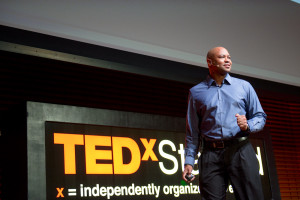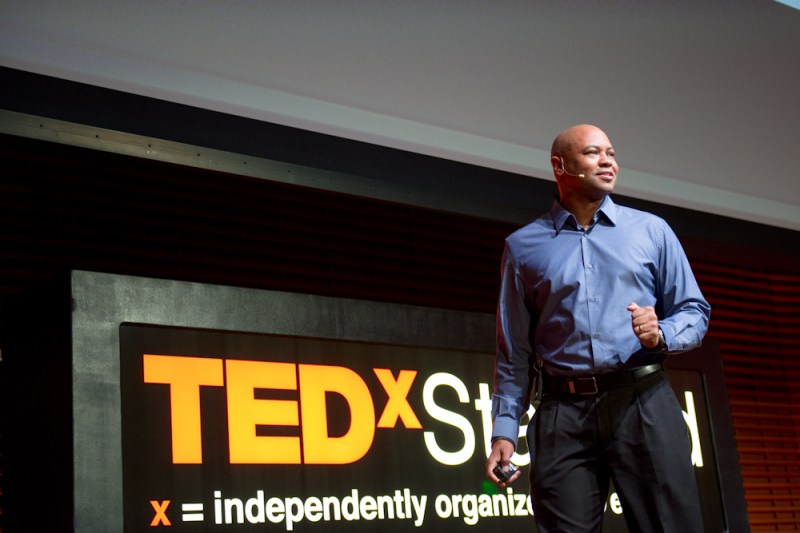Approximately 700 people gathered at Cemex Auditorium on Saturday for the second annual TEDxStanford event, which featured Stanford-affiliated speakers and performers including football coach David Shaw ’94, Indian folk dance group Basmati Raas and Rhodes Scholar Rachel Kolb ’12 M.A. ’13.

The five-hour event’s 27 talks and performances revolved around the theme of “research, reinvent and recreate,” focusing on topics from groundbreaking research on multitasking to the process of designing a sustainable house.
TEDx events are independently organized but modeled after the nonprofit organization TED, which annually hosts two conferences at which—according to the TED website —“the world’s most fascinating thinkers and doers” give speeches of 18 minutes or less.
The first TEDx Stanford event, hosted last year by the Office of Public Affairs, drew almost 600 attendees. Tickets for this year’s event became available online on April 8 and sold out in less than 30 minutes.
Director of Media Initiatives Melinda Sacks ’74, the conference’s producer, said she attempted to reach out to departments and schools across the University to find speakers. While the Office of Public Affairs will solicit feedback about this year’s TEDxStanford through online surveys and monitoring tweets, Sacks said that she believes that the event lived up to the hype.
“I heard people talking at the break and everybody seems very moved,” Sacks said. “What you hope is that people walk out and continue to talk about these topics and to think about things differently.”
Starting research early
The youngest speaker at the event was Tara Adiseshan ’13 M.A. ’13, who will graduate this spring at the age of 18. Adiseshan, who was home-schooled, began searching for collegiate research opportunities at age 12.
After seven months of looking—during which she was repeatedly turned down because of her age—Adiseshan began working on a project with endangered amphibians at the Harris Lab at James Madison University, and she eventually published a paper detailing her findings.
Adiseshan has since conducted research in the Taylor Lab at the University of Virginia and the Hadly Lab at Stanford, winning the 2009 Intel Young Scientist award for her work in the Taylor Lab.
“What I have learned over the years is to see barriers that I thought existed and ignore them,” Adiseshan said.
In an interview with The Daily after the event, Adiseshan said that she wanted her talk to convey the importance of privileges, such as a strong family support system, in motivating young thinkers and researchers.
“We see certain things like going to college early as a sign of intelligence,” Adiseshan said. “While they could be interpreted as a sign, we also need to be aware of the privileges that come with being born with the situations that make things possible.”
Reinventing Stanford football
Shaw gave a five-minute speech about the history of the Stanford football team, focusing on the 2006 season when the program lost eleven of twelve games.
“Some people believed that Stanford football is hopeless, just like saying that a shark couldn’t fly,” said Shaw, referring to an earlier TEDxStanford talk about an “air-swimming” shark toy designed by Blake English ’09 M.S. ’10.
In Shaw’s two years as head coach, the football team has appeared in back-to-back BCS Bowls and amassed an overall record of 23-4. A two-time Pac-12 Coach of the Year, Shaw most recently guided the Cardinal to its first Rose Bowl victory in over four decades.
Though Shaw found success on the field, he said he was focused on getting the players to “take full advantage of the University” and wanted to improve player graduation rates.
“What I was told when I graduated [from] Stanford was that whatever you do, do it extremely well so that you can change the world,” Shaw said. “These things combined to give me the topic of Stanford football changing the world.”
In an interview with The Daily after his speech, Shaw said that TEDxStanford was different from many other events he has spoken at because of the audience’s high energy level.
“There is an energy at TED talks which is hard to explain,” Shaw said. “[From] every speaker, you can learn something, and everyone is doing something that other people are not doing. There is just this anticipation from the audience like they can’t wait for the next speaker.”
Tubbs on rejection and loss
The event also featured a speech from Michael Tubbs ’12 M.A. ’12, who ran for City Council in his hometown of Stockton, Calif. earlier this year. He is just the third politician to be endorsed by Oprah Winfrey—after President Barack Obama and Newark Mayor Cory Booker ’91 M.A. ’92—and was elected with over 60 percent of the vote.
Tubbs is also a Truman Scholar, a former president of the Stanford NAACP chapter and a recipient of the Dinkelspiel Award, an honor that recognizes exceptional contributions to undergraduate education or the quality of student life at Stanford.
After growing up with a single mother and incarcerated father, Tubbs founded The Phoenix Scholars, a non-profit organization aiming to help young people become the first in their families to go to college.
Tubbs referenced his rejection from a fellowship that he applied to during his junior year, the loss of a cousin while Tubbs was participating in the Stanford in Washington Program and the recent death of a friend as experiences that helped him reevaluate his career path and realize what he wanted to accomplish with his life.
“When my friend passed, it reminded me of all the other low points that transformed me into being a city councilor,” Tubbs said. “To get to those mountain-top experiences, we have to go through the valleys.”
